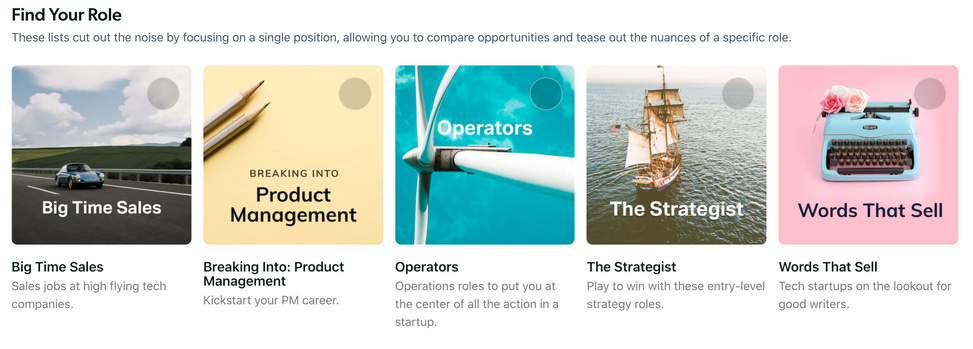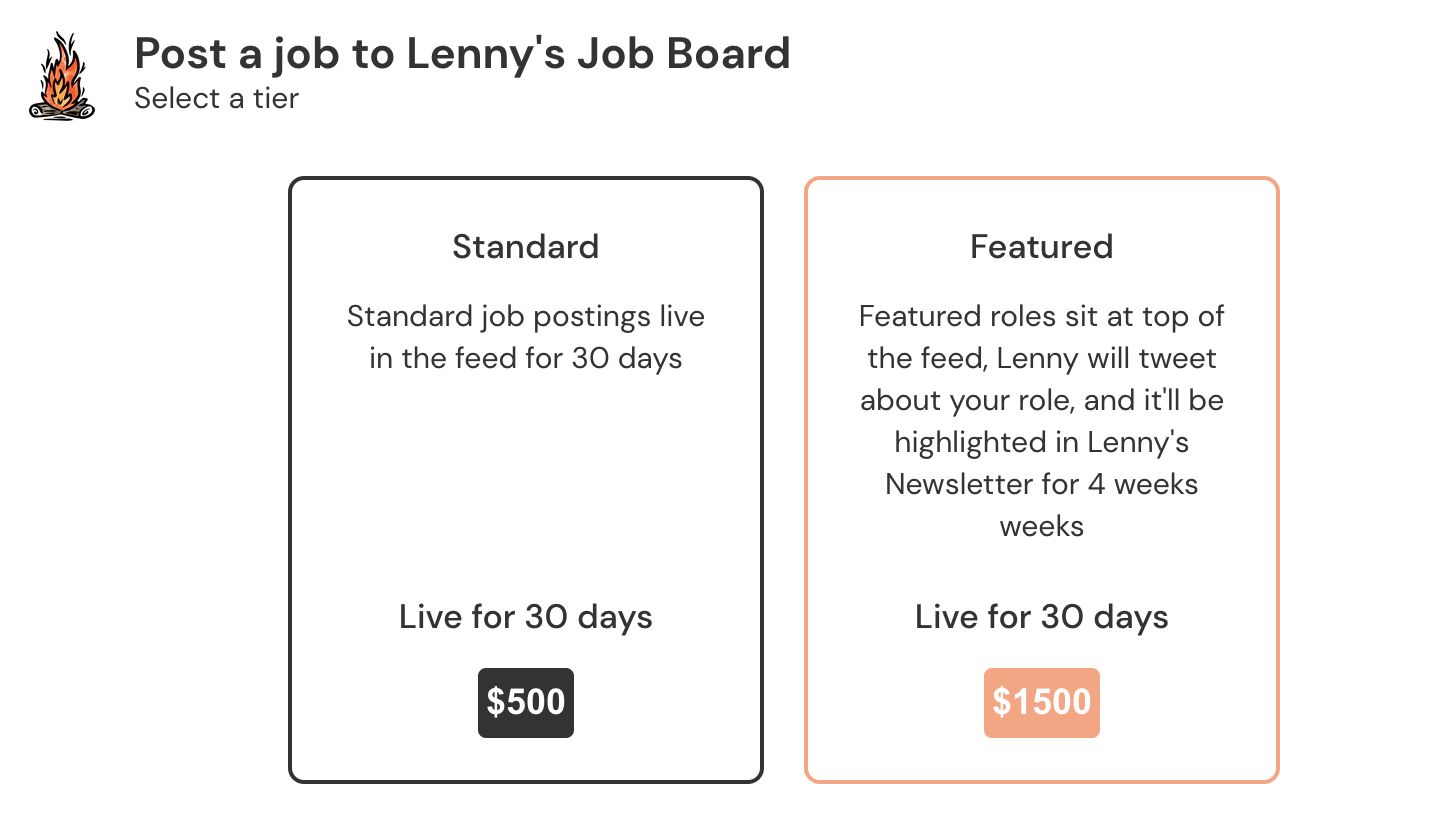Hey hey 👋,
Last week, I wrote about Beacons, a link-in-bio website builder that aspires to dominate the creator economy like what Shopify did in the e-commerce world. This week’s startup is another emerging player that helps creators to create more value for their fans. The approach? Curated job board.
Let’s dive in…
As Gaby Goldberg puts it in her blog, Curators Are the New Creators:
The real scarcity isn’t content anymore. It’s attention. When it’s impossible to absorb everything from the flood of information, the best we can do is pick and choose what matters to us most — or, better yet, find the people who can do the curating for us.
I resonate with this sentiment deeply because it's one of the two core reasons I started Consumer Startups - 1) to learn in public and share those learnings with friends, and 2) to curate the most relevant trends and fundraising news in the consumer space for anyone interested, something I could not find anywhere else.
I still vividly remember my first post where I shared about the emergence of Clubhouse (btw.. Is it just me or does the app feel so dead now lol).
🌱 Genesis of Pallet
Kai Han, a recent Oxford graduate and the founder of Pallet also noticed this curation trend. Kai studied Economics at Oxford with a specialization in Labor Economics. During his studies, he found the talent market to be a fascinating aspect of the macroeconomy. He got to experience it first-hand as he started to look for jobs. Well… it was brutal.
“I have built up all these experiences online, participating in different communities on Twitter or Slack, but none of them really helped with my recruiting process. I had to apply on Indeed and LinkedIn but I wouldn’t even know what to search for.” - Kai
Jumping into the Rabbit Hole
His academic learning and his personal experiences prompted him to dive deeper into the space. As an entrepreneurial college student, Kai wanted to explore opportunities to create a better talent marketplace product.
After identifying recruiting space, he went deep down the rabbit hole by messaging all the people in the space and reading case studies on previous entrants. He realized two interesting insights:
Talent marketplaces can have a negative network effect
“Adding more candidates in the pool doesn’t improve the experience for everyone. In fact, it makes it more challenging for both companies and candidates. It becomes noisier for recruiters and more difficult for candidates to get noticed.” -Kai
It is extremely challenging to build a scalable labor marketplace for the knowledge space
“Fundamentally, recruiting is not a product-based industry - it’s a service industry. The only product that has worked at scale is CRM. However, if you ever attempt to build a CRM, LinkedIn will destroy you. Most verticalized hiring markets or automated candidate matching platforms work well in the beginning because the candidate pool is curated but they usually fail at scale.” -Kai
First Attempt: Cardea
These insights led him to a key thesis - the only way to build a scalable product in the recruiting space is to create the infrastructure layer that can support different niche recruiting marketplaces.
Their first attempt - building a consumer product. It was called Cardea - curated playlists of jobs. Users could subscribe to these “playlists” to receive jobs in their personalized “streams”.
“Our initial goal was to attract enough attention to start doing some outbound— finding people who were big in the tech-twitter sphere so they could ‘guest curate’ a list. Our aim was to build a critical mass of users utilizing the product's novelty and the viral reach of our guest curators. Once that happened, we'd get businesses involved.” - Pallet Blog
Pivot: Building for Creators
I have noticed that most young founders tend to resort to building a consumer product for their first startup rodeo. However, consumers are fickle, and it is incredibly painful to get to virality. Kai and his team also realized this challenge.
The first catalyst for the pivot came from a conversation they had with a newsletter writer Ian Kar, who founded Fintech Today. They pitched the Cardea idea to Kar and wanted him to guest curate a job list on the platform.
Ian was interested in helping out but he also suggested an alternative to the team which was to help him create an entire recruiting backend system.
The second validation came from a chat with Lenny Rachitksy, one of the most well-known tech newsletter writers (my personal favorite newsletter writer!!). Lenny had no interest at all in guest curating a list but he was in the market for a job board because he had companies already paying him big bucks to feature roles in his newsletter. He wanted to have a solution that would aggregate all those roles in one place and allow him to monetize easily.

It clicked for the team:
“Lenny was offering to put the horse in front of the cart. Instead of trying to create a two-sided marketplace from scratch— we start by building with those who either have some sort of a marketplace already or have clear potential to create one.” - Pallet blog
After that conversation, Kai and his team decided to pivot from the consumer idea and build a job board product for creators like Ian and Lenny.
💸 The Business of Job Boards
Lenny became the first Pallet creator. Due to Lenny’s large platform of 100K+ loyal followers, words started to spread, specifically within the tech newsletter space. Many other well-known tech writers joined the platform, such as Packy McCormick and Sahil Bloom. So far, Kai and his team have onboarded 50 creators and amassed 1000+ on the waitlist.
The product is quite simple - a job board site managed by the creator. Companies pay the creator to be listed on the platform. Despite the simplicity of the product, it just works.
Creators - it is an easy way for creators to develop a different income stream - plus, many newsletter writers are promoting jobs on their posts already.
Fans - it is an efficient way to gain access to jobs that fit their interests. Knowledge workers are constantly looking to pivot or gain new experiences. Nowadays, many people are switching jobs every two years, especially in the tech industry.
Companies - they gain a curated list of candidates that are likely a better fit for the job than candidates from those horizontal job aggregators like Indeed. Pallet can be a quality top of the channel depending on the size of the creator’s platform. For example, 150+ job applications were sent within the first 24 hours when Sahil Bloom launched his pallet board.
Economics
As a newsletter writer myself, I got quite interested in the economic upside of running a job board.
The model is straightforward, similar to Substack. The creator gets to decide how much they charge per job post and how long the job will be shown on the job board. Pallet takes a 10% commission fee.
Let’s use Lenny as an example and calculate the expected annual income from running a job board. One thing to note here is that Lenny is one of the best-known writers within the tech newsletter space, so he might not be the best representation of a typical creator.
Lenny charges two rates on the website - $500 for a 30-day standard job post and $1500 for a 30-day featured job post.
At the time I was writing this piece, there were 39 jobs on his job board and 11 of those were featured job posts. For the simplicity of the exercise, let’s assume, on average, there are 40 job posts on the platform every month - 30 regular job posts and 10 featured ones. I believe this is a conservative assumption. The number of job posts will likely increase over time as more companies find out about this new channel.
Here is the model:
Rumor on the street is that Lenny bagged over $360K from paid newsletter subscribers in 2020. He is expected to double that income this year just by posting jobs, without the need to add any new paid subscribers 🤯. Also, since he was already posting jobs long before Pallet, the marginal cost should be very very low.
This is why I f**king love creator tools. They unleash new income streams and make it ridiculously easy for creators to make a living by doing things they are passionate about.
👀 Some challenges ahead
Pallet is betting on a future where jobs become increasingly more distributed and community-driven. It aims to become the Shopify of the recruiting world, the infrastructure layer powering all the niche vertical recruiting marketplaces. However, it still has a ton of challenges to overcome before realizing that vision.
The first one is scalability. This model would work great for creators with over 30K loyal subscribers, but it might not work as well for the majority of creators who only have under 1000 fans. To become a venture-scale business, Pallet needs to create solutions that can also address the long tail.
The second one is competition. It will face a similar challenge that I talked about in my previous post regarding the link-in-bio space. As a business model proves to be lucrative and effective, many new entrants will come in from different angles to compete for those top creators. Perhaps the next startup might build the same tool but focus on another creator segment - a problem that both Linktree and Substack are currently facing.
💸 Fundraising advice from Kai
At the end of my call with Kai, he was kind enough to share some tactical pre-seed fundraising advice for founders, specifically young founders who don’t have a proven track record.
#1 - Find a mentor or a program that will help you out
In the case of Kai, he was able to find an alum at Oxford that bought into his vision and was willing to help. He vouched for Kai and made several important intros for the pre-seed.
“If you don't have a network, you need something to green light you. Whether it is a mentor or an accelerated program, you need to find someone to believe in you and help you out with the process.”
#2 - Create FOMO and keep all meetings in a short window
“Fundraising is a game and FOMO (fear of missing out) is an important tool to get investors interested. I also recommend booking all the meetings within a short two-week window. It can drive FOMO, and it is more efficient for the founder.”
#3 - Intellectual honesty
“When you are telling your story, it is important to be intellectually honest. No one expects a pre-seed founder to have everything figured out. However, you should have a very clear understanding of what the key assumptions are, why, and how you are going to validate those assumptions. Investors are looking for someone who has a big vision and clearly understands the key levers that will make or break the business.”
Thank you Kai for chatting with me! Make sure to check out Pallet if you are a creator interested in adding a job board to your content.
One last question... should I start a consumer-focused job board? Please reply to this email if you would like to see it happen. I will create one after getting 20 replies from y’all.
See you next Sunday ✨,
Leo






